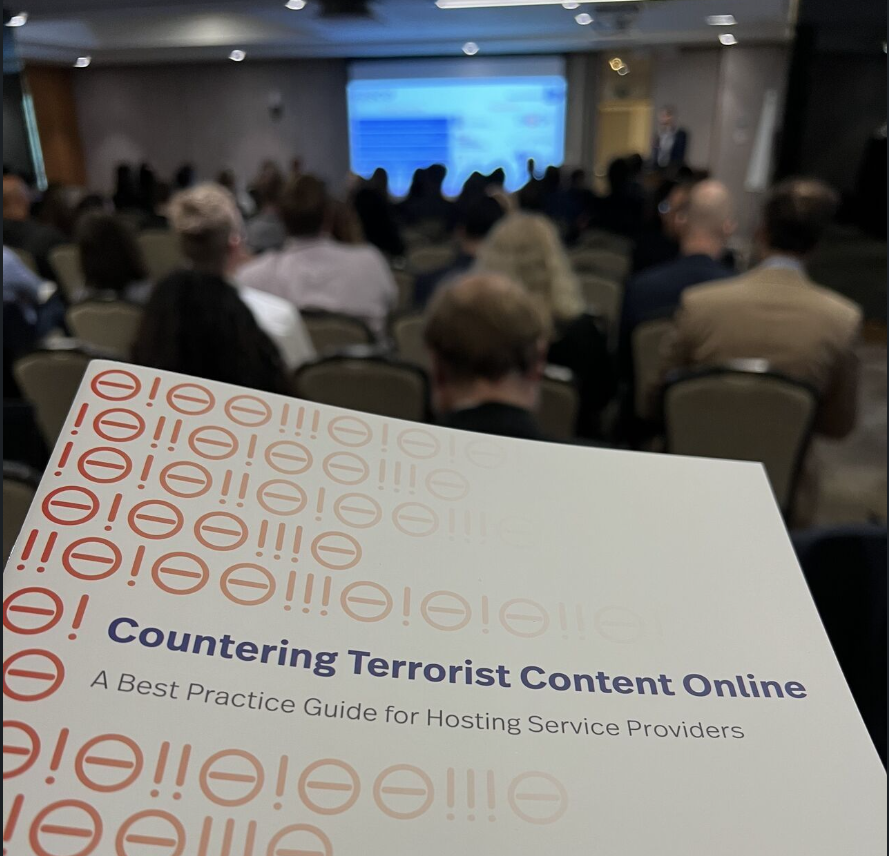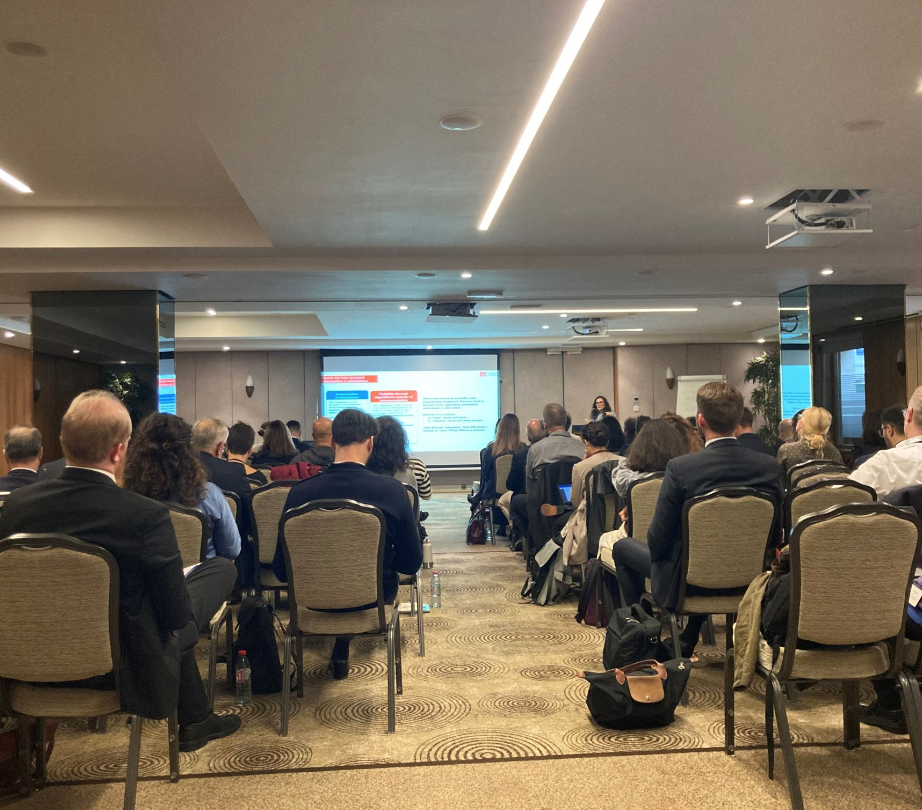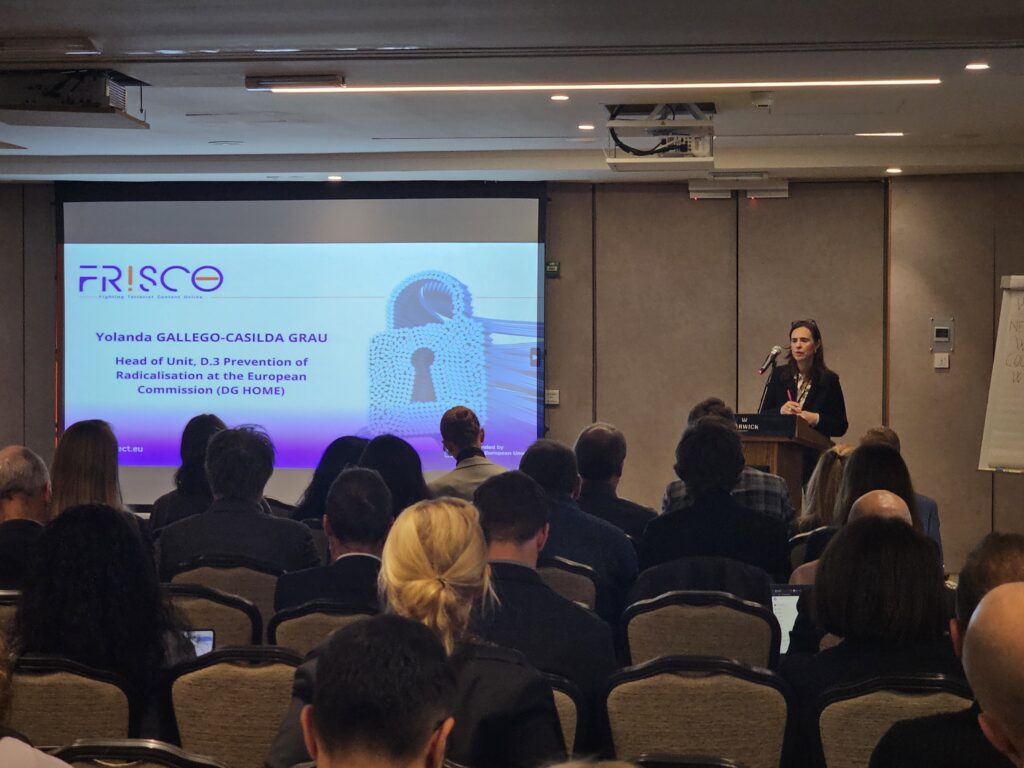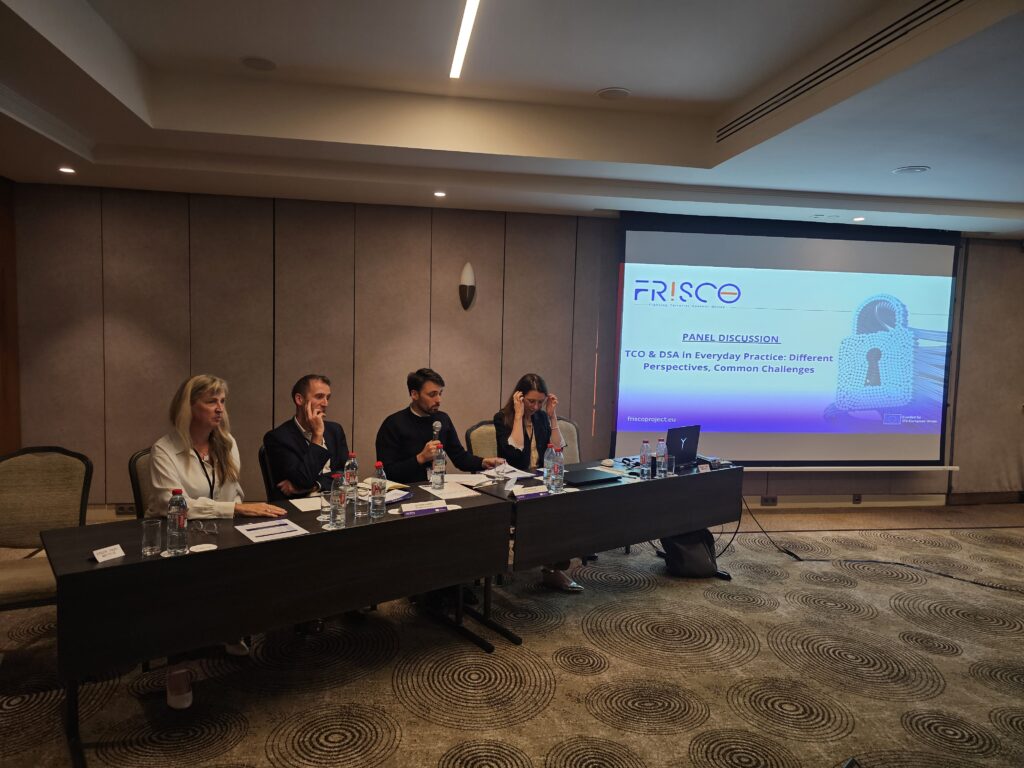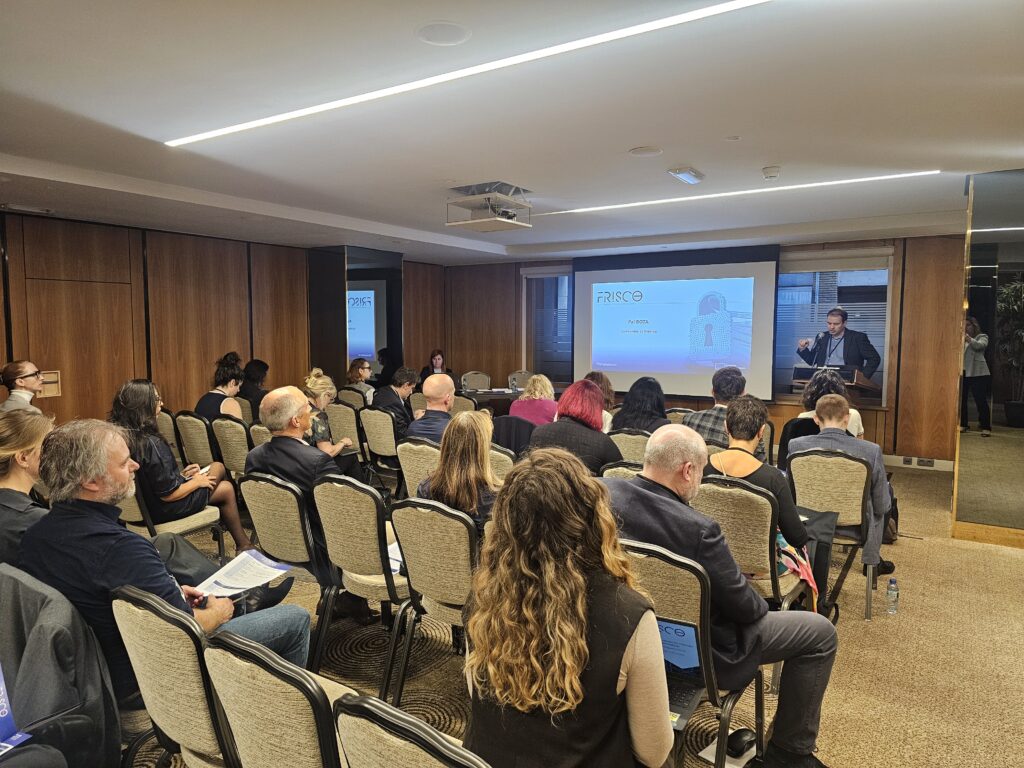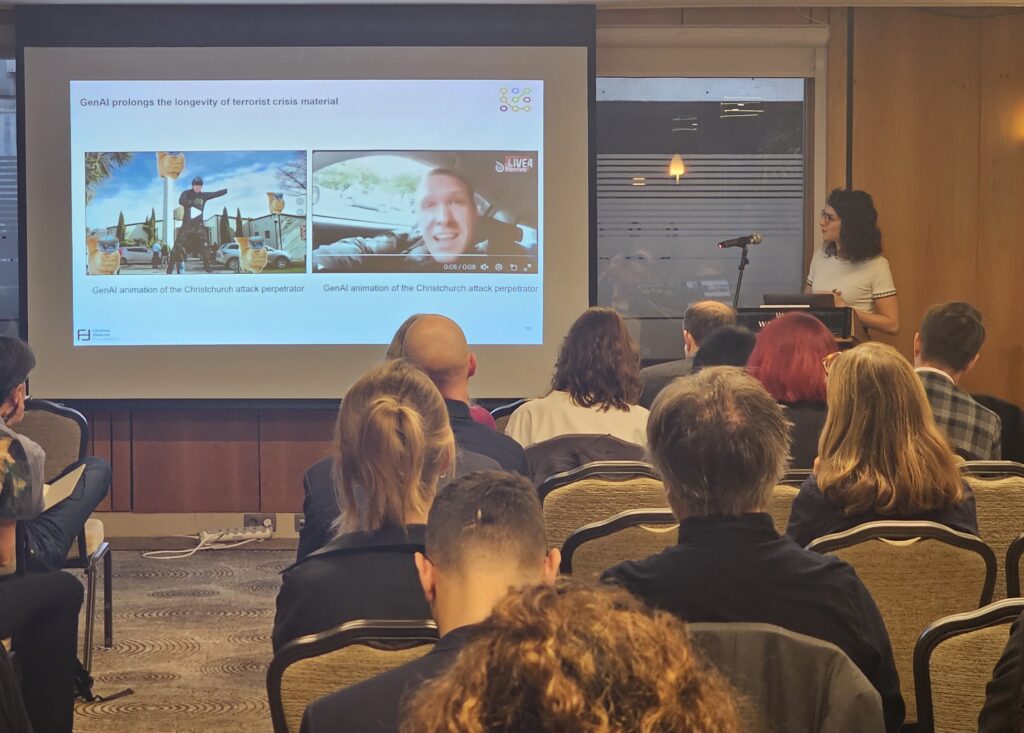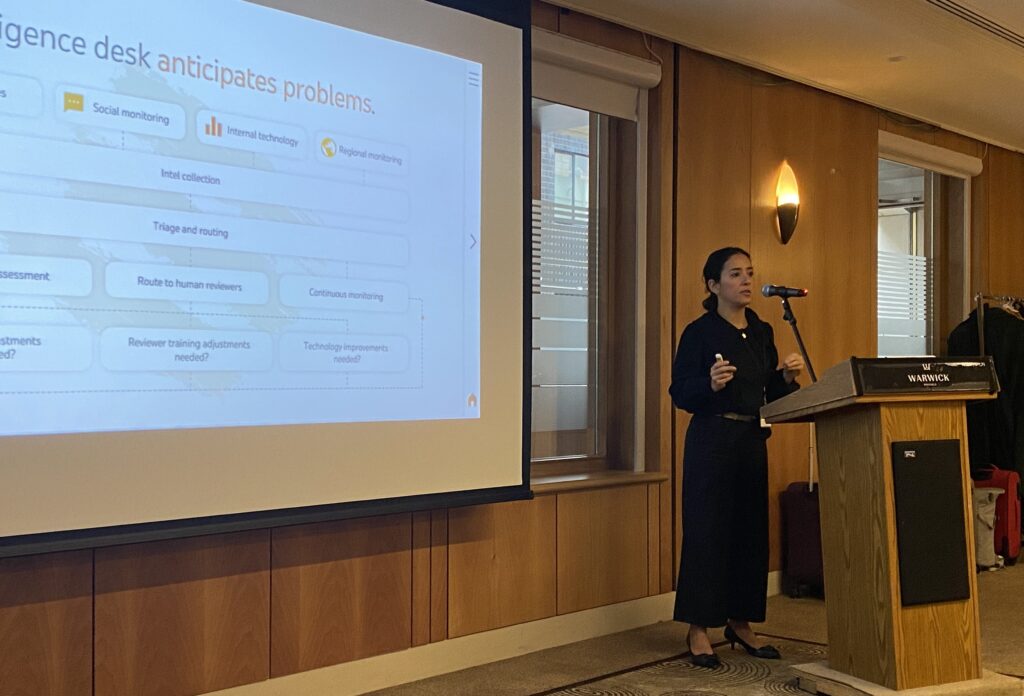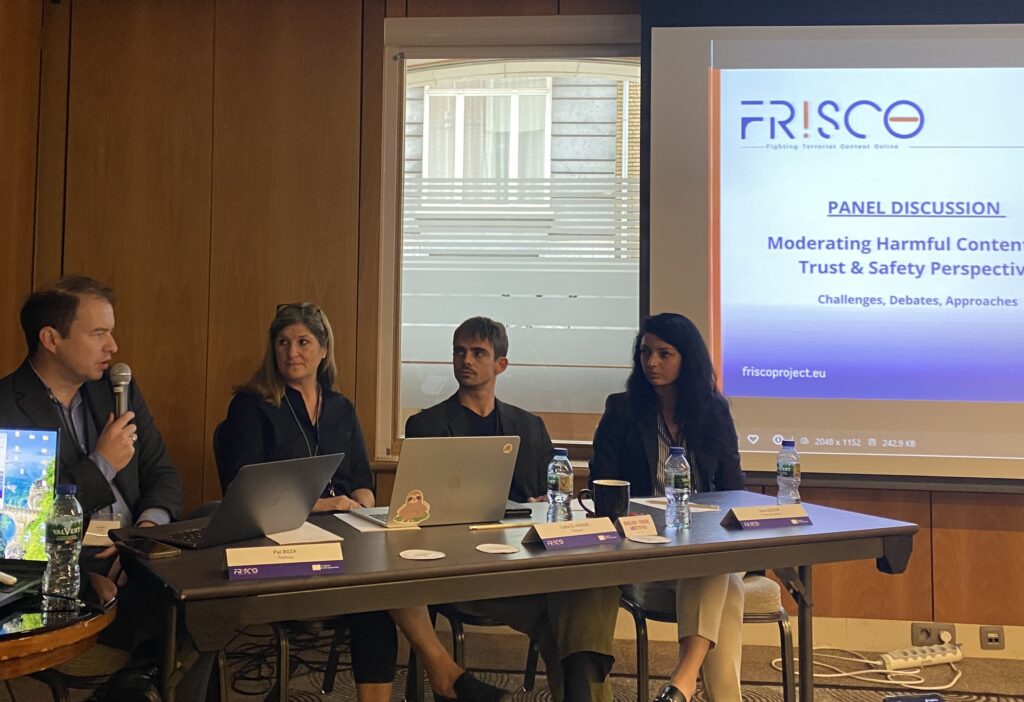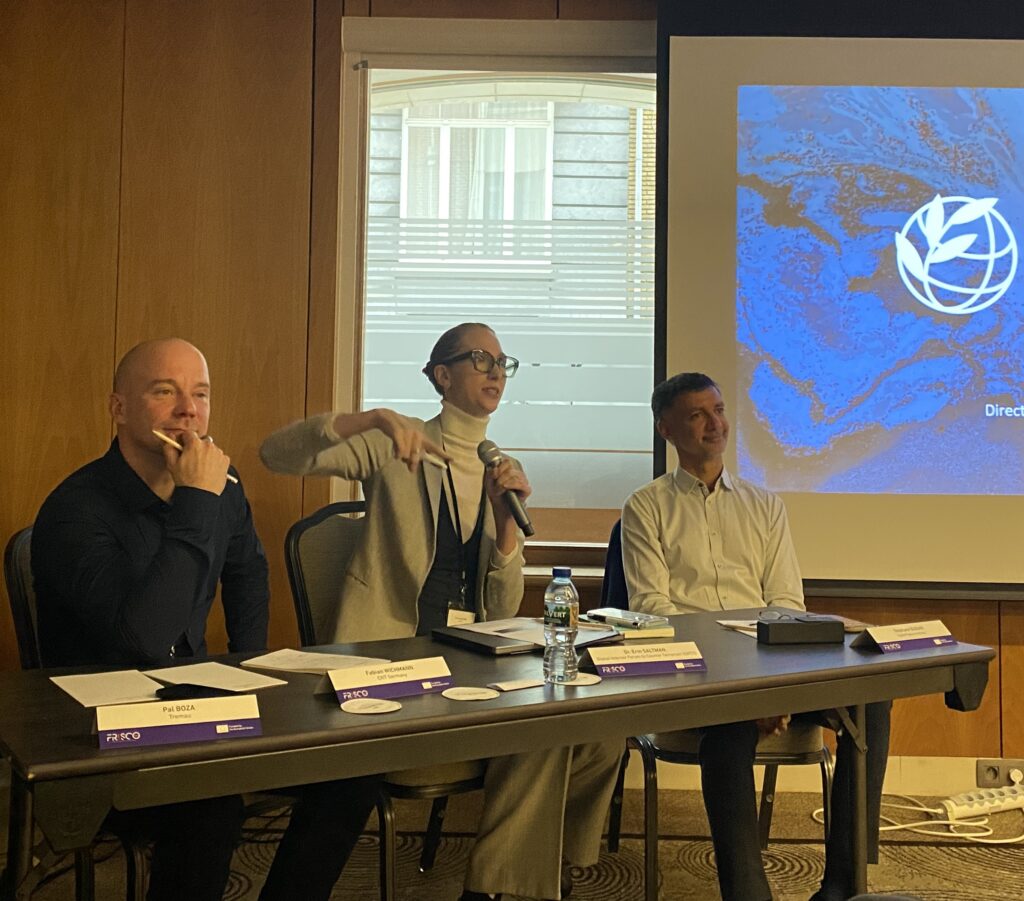Final Conference
FRISCO Final Conference – “Fighting Terrorist Content Online: Progress, Challenges & Perspectives” (17-18 October 2024, Brussels)
The TCO regulation came into force more than two years ago. Soon after, the FRISCO (Fighting Terrorist Content Online) project was launched to support micro and small tech platforms in their content moderation and compliance efforts. Since then, the FRISCO Project has successfully provided support through information, tools, training, best practice materials, collaboration and research. To celebrate and ensure its continued success, the FRISCO project held its final two-day conference in Brussels on Thursday 17 and Friday 18 October 2024. This event aimed to open new streams of cooperation and practice by bringing together experts and practitioners from different fields (EU officials, policy makers, law enforcement, regulators, tech sector representatives, academics, researchers, NGOs, etc.) to discuss strategies to curb online terror. The focus was on bridging the gaps between policy, practice, law enforcement and research, as well as between the different components of P/CVE (Preventing and Countering Violent Extremism) at EU level.
Objectives
This final conference had five objectives:
- Present the results and products of the FRISCO project in a comprehensive manner, while ensuring their continued success and dissemination.
- Bring together experts and practitioners to build partnerships and share experience, knowledge and best practice in a single forum.
- Present the main successes and challenges related to the implementation of the TCO Regulation and, more generally, to compliance with EU digital regulation (e.g. DSA), based on the experience of key stakeholders.
- Examine the online terror threat landscape, highlighting key trends and their link to offline events, thanks to insights from the European research community
- Assess the effectiveness of countermeasures and discuss practical solutions for countering harmful narratives, content distribution strategies and malicious use of new technologies.
Sessions & Speakers
The programme included five sessions over two days, with Day 1 (17 October) focusing on “Terrorist Use of the Internet: Trends & Regulations” and Day 2 (18 October) on “Countering Online Terror: Practices & Responses”.
- A changing threat landscape? Terrorist Use of the Internet – Trends & Challenges
- Navigating the EU’s Digital Regulation Landscape. TCO Regulation & Digital Services Act – Practicalities & Insights
- Seeing through the Eyes of Tech Platforms. From Micro to (Very) Large Tech Platforms – Needs, Capacities & Challenges.
- Moderating Harmful Content: Challenges, Debates & Approaches in a Trust & Safety Perspective
- Improving our Counterterrorism Response – Perspectives, Partnerships, Practices
Following their insightful contributions which made the event a success, we would like to extend our warmest thanks to all our participants and speakers, listed in alphabetical order: Dr. Dimitra CHONDROGIANNI (Greek E-Commerce Association, ALLIES), Diarmuid COEN (Coimisiún na Meán, Ireland), Anne CRAANEN (Institute for Strategic Dialogue), Anna DE MARCHI (European Commission, DG CNECT), Stéphane DUGUIN (CyberPeace Institute), Dr. Julia EBNER (University of Oxford, Violent Extremism Lab), Lydia EL-KHOURI (Textgain), Hadelin FERONT (META), Yolanda GALLEGO-CASILDA GRAU (European Commission, DG HOME), Arda GERKENS (ATKM, Netherlands), Yann LESCOP (Point de Contact), Dr. Beatriz LOPES BUARQUE (London School of Economics), Charlotte MARIEN (European Commission, DG HOME), Louise MELOY (Tech Against Terrorism), Lucile PETIT (Arcom, France), Yolina PETROVA (Identrics), Dr. Erin SALTMAN (Global Internet Forum to Counter Terrorism, GIFCT), Dr. Christina SCHORI LIANG (Geneva Centre for Security Policy, GSCP), Andrew STANIFORTH (SAHER, Tech Against Terrorism Europe), Fabian WICHMANN (EXIT Germany), Cecilia ZAPPALA (Youtube).
Recommendations
The final conference of the FRISCO project brought together a diverse group of experts, stakeholders and practitioners to discuss the pressing issues surrounding terrorist content online. Over two days, participants engaged in thoughtful discussions and shared insights on the evolving threat landscape, the role of tech platforms, and the need for collaborative approaches to counter terrorist content and radicalisation online. Find below a summary of the 10 recommendations stemming from the conference:
1. Tailor Solutions for Small Platforms – Ensure that the resources produced by the TCO cluster are widely available. Where necessary, develop additional resources and training specifically for small HSPs to improve content moderation and compliance, focusing on easy-to-use tools and threat awareness.
2. Boost Multi-Stakeholder Collaboration – Strengthen cooperation between tech platforms, EU bodies, governments, academia, and civil society to share best practices and resources for dealing with terrorist and harmful content.
3. Improve Regulatory Compliance – Where necessary, provide additional guidance and workshops to ensure that tech platforms, especially the smaller ones, understand the TCO Regulation and DSA requirements, with accessible resources for ongoing support.
4. Responsible Use of AI – Promote AI in content moderation responsibly by creating guidelines to reduce algorithmic bias and improve transparency.
5. Invest in Human Moderation – In addition to automated tools, ensure that content moderation is always done with a human in the loop, and that human moderators are psychologically supported and trained in cultural awareness, bias detection and resilience to facilitate sensitive, effective moderation.
6. Promote Research and Innovation – Support research into the drivers of online radicalisation and invest in advanced detection tools to inform policy and identify extremist content, including AI-generated media.
7. Emphasise Educational Initiatives – Integrate digital literacy and critical thinking into education to help young people critically engage with online content and recognise extremist narratives.
8. Encourage Counter-Narratives – Support initiatives that create counter-narratives to extremism, working with civil society to produce engaging content with wide reach.
9. Stay Ahead of Emerging Threats – Continually monitor trends in online extremism, including synthetic media, and update policies and tools to proactively address these threats.
10. Leverage Cross-Platform Strategies – Develop coordinated frameworks for platforms to share data and jointly tackle extremist content, especially in cases of viral misinformation and coordinated attacks.
You can find the full report below, as well as the detailed programme and final agenda.
